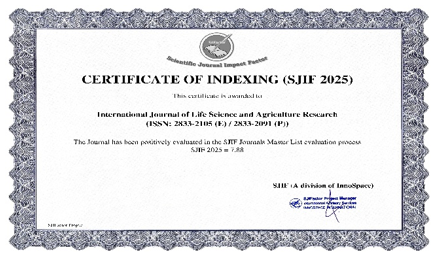Non-Destructive Methods for Predicting Soil Chemical Characteristics: A Narrative Literature Review
DOI:
https://doi.org/10.55677/ijlsar/V04I04Y2025-02Keywords:
Spectroscopy, Remote Sensing, Agricultural Sustainability, Soil Fertility, Environmental Monitoring, Precision AgricultureAbstract
This study presents a comprehensive review of non-destructive methods for predicting soil chemical characteristics, addressing the growing need for sustainable and efficient soil analysis techniques in agricultural and environmental management. Traditional destructive soil sampling methods, while standardized, present limitations in terms of ecological disruption and spatial representation. The review examines emerging non-destructive technologies, including visible and near-infrared spectroscopy, remote sensing, and geophysical methods, evaluating their effectiveness in assessing key soil parameters such as pH, electrical conductivity, cation exchange capacity, and nutrient content. The analysis encompasses recent technological advancements, practical applications, and the integration of these methods into sustainable agricultural frameworks. Findings indicate that non-destructive techniques offer promising alternatives for rapid, continuous soil monitoring while preserving soil structure integrity. This research contributes to the development of more efficient and environmentally conscious approaches to soil analysis, supporting informed decision-making in agricultural practices and land management.
References
1. Sharma, S., Lishika, B., Shubham, S., & Kaushal, S. (2023). Soil quality indicators: a comprehensive review. International Journal of Plant & Soil Science, 35(22), 315-325. https://doi.org/10.9734/ijpss/2023/v35i224139
2. Piccini, C., Metzger, K., Debaene, G., Stenberg, B., Götzinger, S., Borůvka, L., … & Liebisch, F. (2024). In‐field soil spectroscopy in vis–nir range for fast and reliable soil analysis: a review. European Journal of Soil Science, 75(2). https://doi.org/10.1111/ejss.13481
3. Barra, I., Haefele, S., Sakrabani, R., & Kebede, F. (2021). Soil spectroscopy with the use of chemometrics, machine learning and pre-processing techniques in soil diagnosis: recent advances–a review. Trac Trends in Analytical Chemistry, 135, 116166. https://doi.org/10.1016/j.trac.2020.116166
4. Assefa, F., Elias, E., Soromessa, T., & Ayele, G. (2020). Effect of changes in land-use management practices on soil physicochemical properties in kabe watershed, ethiopia. Air Soil and Water Research, 13. https://doi.org/10.1177/1178622120939587
5. Mustapen, R., Mohamad, M., Noordin, A., Kafi, M., Razalli, M., Ismail, H., … & Chellamuthu, V. (2024). Potentiality of pressmud application in soil for palm oil plantation productivity. PaperASIA, 40(1(b)), 31-38. https://doi.org/10.59953/paperasia.v40i1(b).59
6. Vassilina, T., Nasiyev, B., Rvaidarova, G., Shibikeyeva, A., SEİTKALİ, N., Salykova, A., … & YERTAYEVA, Z. (2023). The effects of clinoptilolite type of zeolite and synthesised zeolite-enriched fertilizer on yield parameters of cucumber (cucumis sativus) plant and some chemical properties in dark chestnut soil. Eurasian Journal of Soil Science (Ejss), 12(3), 277-281. https://doi.org/10.18393/ejss.1284506
7. Choi, H. (2020). The origin of selective adsorption of co2 on merlinoite zeolites. Angewandte Chemie, 60(8), 4307-4314. https://doi.org/10.1002/anie.202012953
8. Wang, X., Zhang, X., & Zhang, D. (2023). Enhancement of cation exchange and glucose binding capacity, flavonoids release and antioxidant capacity of tartary buckwheat powder with ultrafine grinding. Frontiers in Nutrition, 10. https://doi.org/10.3389/fnut.2023.1276017
9. Medyńska‐Juraszek, A., Álvarez, M., Białowiec, A., & Jerzykiewicz, M. (2021). Characterization and sodium cations sorption capacity of chemically modified biochars produced from agricultural and forestry wastes. Materials, 14(16), 4714. https://doi.org/10.3390/ma14164714
10. Lemma, S., Boi, C., & Carbonell, R. (2021). Nonwoven ion-exchange membranes with high protein binding capacity for bioseparations. Membranes, 11(3), 181. https://doi.org/10.3390/membranes11030181
11. Wells, J., Crow, S., Sierra, C., Deenik, J., Carlson, K., Meki, M., … & Kiniry, J. (2022). Edaphic controls of soil organic carbon in tropical agricultural landscapes. Scientific Reports, 12(1). https://doi.org/10.1038/s41598-022-24655-y
12. Wu, S., Liu, Y., Southam, G., Robertson, L., Wykes, J., Yi, Q., … & Huang, L. (2021). Rhizosphere drives biotite-like mineral weathering and secondary fe–si mineral formation in fe ore tailings. Acs Earth and Space Chemistry, 5(3), 618-631. https://doi.org/10.1021/acsearthspacechem.0c00331
13. Diya, R., Meera, A., Rani, B., Leno, N., & John, J. (2023). Physico-chemical characterization of biochar from different biomass materials. International Journal of Environment and Climate Change, 13(11), 2781-2787. https://doi.org/10.9734/ijecc/2023/v13i113446
14. Abdulraheem, M., Zhang, W., Li, S., Moshayedi, A., Farooque, A., & Hu, J. (2023). Advancement of remote sensing for soil measurements and applications: a comprehensive review. Sustainability, 15(21), 15444. https://doi.org/10.3390/su152115444
15. Zhang, F., Wang, C., Pan, K., Guo, Z., Liu, J., Xu, A., … & Pan, X. (2022). The simultaneous prediction of soil properties and vegetation coverage from vis-nir hyperspectral data with a one-dimensional convolutional neural network: a laboratory simulation study. Remote Sensing, 14(2), 397. https://doi.org/10.3390/rs14020397
16. Yang, M., Xu, Y., Zhang, J., Chen, H., Liu, S., Li, W., … & Hao, Y. (2020). Near-infrared spectroscopic study of heavy-metal-contaminated loess soils in tongguan gold area, central china. Minerals, 10(2), 89. https://doi.org/10.3390/min10020089
17. Wei, L., Pu, H., Wang, Z., Yuan, Z., Yan, X., & Cao, L. (2020). Estimation of soil arsenic content with hyperspectral remote sensing. Sensors, 20(14), 4056. https://doi.org/10.3390/s20144056
18. Liang, L. and Zhang, J. (2023). Study of soil salinity in typical areas of the yellow river delta based on remote sensing images.. https://doi.org/10.3233/atde230310
19. Arciniegas-Ortega, S., Molina, Í., & García-Aranda, C. (2022). Soil order-land use index using field-satellite spectroradiometry in the ecuadorian andean territory for modeling soil quality. Sustainability, 14(12), 7426. https://doi.org/10.3390/su14127426
20. Ewing, J., Oommen, T., Jayakumar, P., & Alger, R. (2020). Utilizing hyperspectral remote sensing for soil gradation. Remote Sensing, 12(20), 3312. https://doi.org/10.3390/rs12203312
21. Anand, R. and Subramoniam, R. (2023). Assessing soil nutrient content and mapping in tropical tamil nadu, india, through precursors iperspettrale della mission applicative hyperspectral spectroscopy. Applied Sciences, 14(1), 186. https://doi.org/10.3390/app14010186
22. Zhang, Y., Hartemink, A., Huang, J., & Townsend, P. (2021). Synergistic use of hyperspectral imagery, sentinel‐1 and lidar improves mapping of soil physical and geochemical properties at the farm‐scale. European Journal of Soil Science, 72(4), 1690-1717. https://doi.org/10.1111/ejss.13086
Downloads
Published
Issue
Section
License
Copyright (c) 2025 International Journal of Life Science and Agriculture Research

This work is licensed under a Creative Commons Attribution 4.0 International License.












